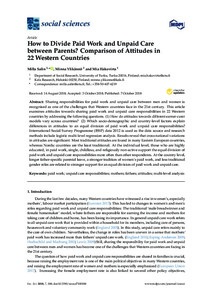How to Divide Paid Work and Unpaid Care between Parents? Comparison of Attitudes in 22 Western Countries
Minna Ylikännö; Milla Salin; Mia Hakovirta
https://urn.fi/URN:NBN:fi-fe2021042720042
Tiivistelmä
Sharing responsibilities for paid work and unpaid care between men and women is recognised as one of the challenges that Western countries face in the 21st century. This article examines attitudes towards sharing paid work and unpaid care responsibilities in 22 Western countries by addressing the following questions. (1) How do attitudes towards different earner-carer models vary across countries? (2) Which socio-demographic and country-level factors explain differences in attitudes to an equal division of paid work and unpaid care responsibilities? International Social Survey Programme (ISSP) data 2012 is used as the data source and research methods include logistic multi-level regression analysis. Results reveal that cross-national variations in attitudes are significant: Most traditional attitudes are found in many Eastern European countries, whereas Nordic countries are the least traditional. At the individual level, those who are highly educated, in paid work, single, childless, and religiously non-active support the equal division of paid work and unpaid care responsibilities more often than other respondents. At the country level, longer father-specific parental leave, a stronger tradition of women’s paid work, and less traditional gender roles are related to stronger support for an equal division of paid work and unpaid care.
Kokoelmat
- Rinnakkaistallenteet [19207]
